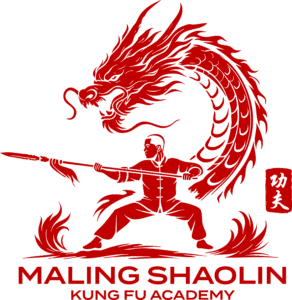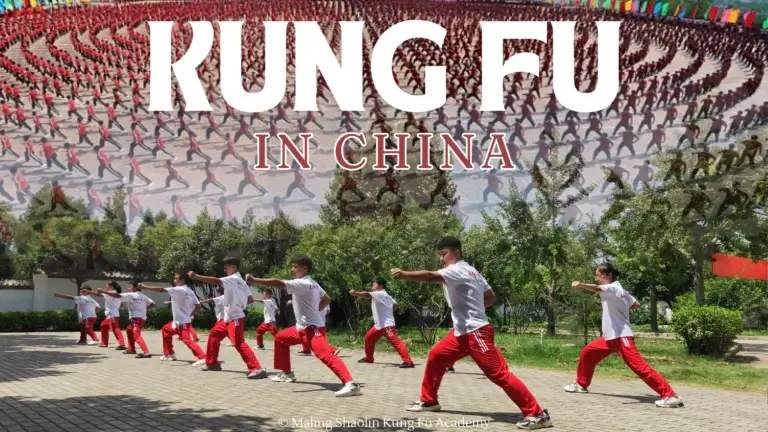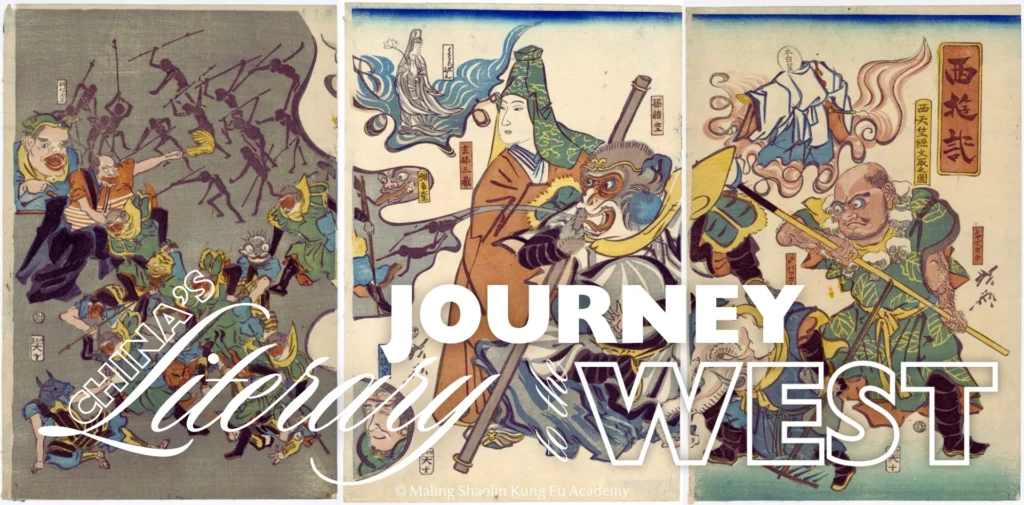
Chinese classical literature is an intricate tapestry of stories, philosophies, and cultural traditions that have shaped not only the societal and cultural landscape of China but have also extended their influence globally. Among these, works that integrate martial arts, such as “Journey to the West” (西游记, Xī Yóu Jì) and “Romance of the Three Kingdoms” (三国演义, Sānguó Yǎnyì), stand out for their profound impact on martial arts, societal values, and literature worldwide. This article explores how these classics have influenced martial arts practices, societal norms, and literary traditions across the globe.
Classical Works and Their Impact
Journey to the West
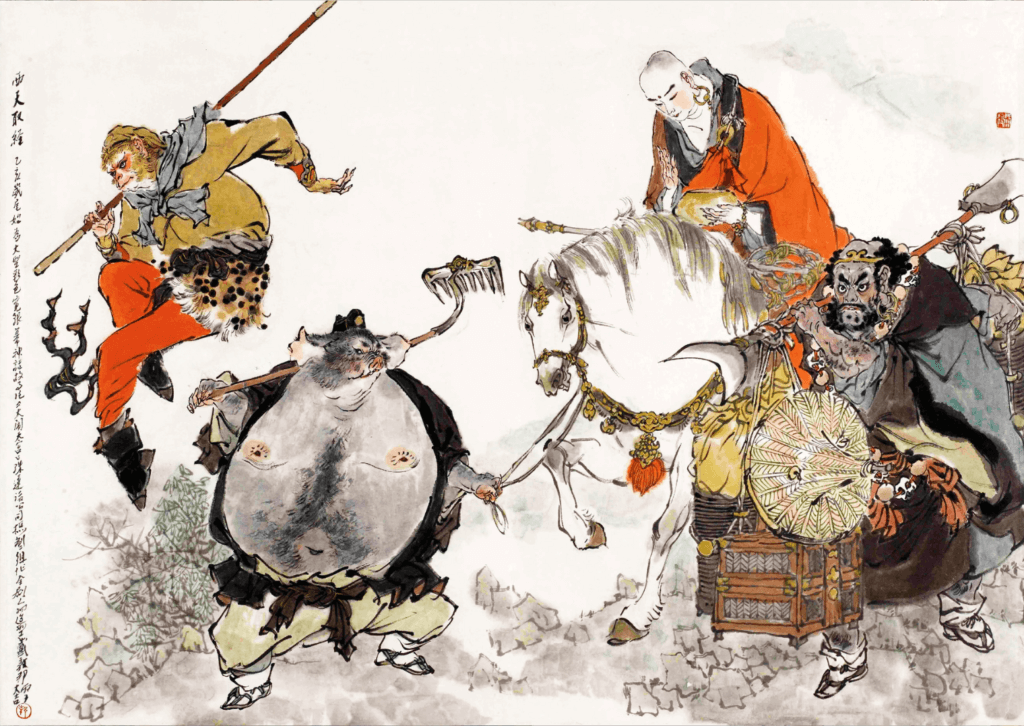
“Journey to the West,” written by Wu Cheng’en during the Ming Dynasty, is a fantastical novel that follows the pilgrimage of the Buddhist monk Xuanzang and his three protectors: Sun Wukong (the Monkey King), Zhu Bajie (Pigsy), and Sha Wujing (Sandy). This tale is rich with martial arts elements, particularly through the character of Sun Wukong, who is depicted as a formidable warrior with supernatural martial abilities.
Influence on Martial Arts:
- Techniques and Philosophy: The character of Sun Wukong embodies agility, flexibility, and the mastery of various martial arts techniques. His use of the magical staff (Ruyi Jingu Bang) has inspired numerous martial arts weapons techniques, particularly in staff fighting.
- Training and Discipline: The themes of rigorous training and self-discipline seen in the novel have been integrated into martial arts training regimens. The journey of the characters serves as a metaphor for the martial artist’s path to enlightenment through perseverance and moral integrity.
Influence on Society:
- Moral Lessons: The novel imparts moral lessons on loyalty, courage, and the importance of inner strength. These values resonate deeply within Chinese society and have influenced cultural norms and educational practices.
- Religious Syncretism: The integration of Buddhist, Taoist, and Confucian elements in the story promotes religious and philosophical syncretism, encouraging a harmonious coexistence of different belief systems.
Global Influence:
- Adaptations and Retellings: “Journey to the West” has inspired numerous adaptations in various media, including television series, films, and animations worldwide. Its themes have influenced storytelling in other cultures, promoting the incorporation of mythical and fantastical elements into mainstream literature. Noteworthy adaptations include “The Forbidden Kingdom” (2008), which stars Jet Li and Jackie Chan, and “The Monkey King” film series, which began in 2014. The tale has also been a rich source of inspiration for animated series and films. Examples include the Japanese anime “Dragon Ball,” which is loosely based on “Journey to the West,” and the animated film “Monkey King: Hero Is Back” (2015).
- Cross-Cultural Exchange: Elements of the story can be found in Western fantasy literature, where quests, mythical creatures, and hero’s journeys are central themes. Authors like Neil Gaiman and Philip Pullman have drawn inspiration from such myths and legends in their works. Scholars and writers also often draw parallels between “Journey to the West” and Western epics like “The Odyssey” and “The Lord of the Rings,” emphasizing universal themes of heroism, adventure, and transformation, though their creation was not influenced by the classic Chinese tale.
Romance of the Three Kingdoms
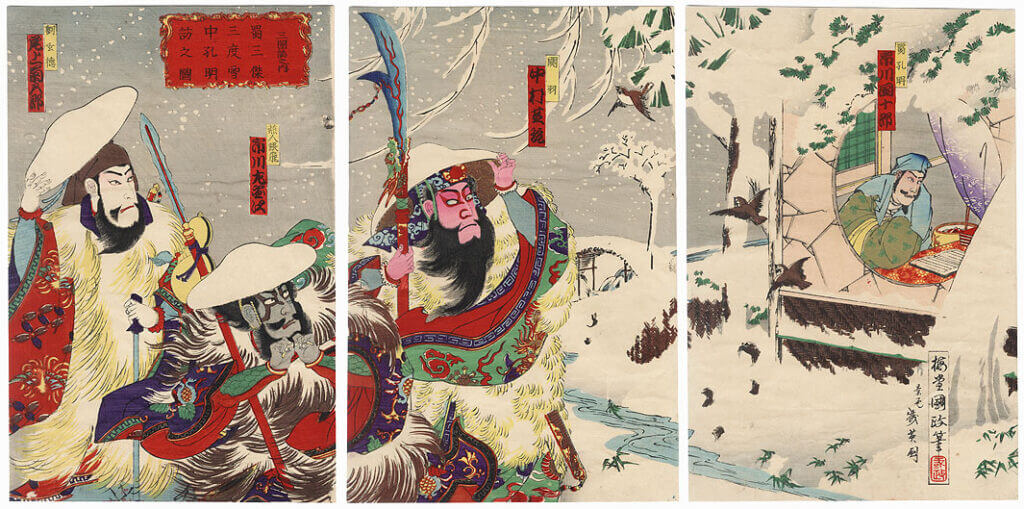
“Romance of the Three Kingdoms,” attributed to Luo Guanzhong, is a historical novel set during the turbulent years at the end of the Han Dynasty and the Three Kingdoms period. It is a complex narrative of political intrigue, warfare, and heroism, featuring iconic figures such as Liu Bei, Cao Cao, and Zhang Fei.
Influence on Martial Arts:
- Warrior Ethos: The valor and martial prowess of characters like Guan Yu and Zhao Yun have become archetypal models for martial artists, emphasizing loyalty, honor, and bravery.
- Strategic Thinking: The novel’s detailed accounts of military strategies and tactics have influenced martial arts schools to incorporate strategic thinking into their training, blending physical skill with mental acuity.
Influence on Society:
- Cultural Identity: “Romance of the Three Kingdoms” has played a significant role in shaping Chinese cultural identity, highlighting the importance of loyalty, familial ties, and righteousness.
- Educational Tool: The novel is often used as an educational tool to teach history, ethics, and strategy, ensuring that these lessons are passed down through generations.
Global Influence:
- Epic Narratives: The novel’s epic scope and intricate characterizations have influenced global literature, encouraging the development of complex, multi-layered narratives. Authors like George R.R. Martin, in his “A Song of Ice and Fire” series, have created similarly complex worlds with large casts of characters and interwoven storylines. The deep and multifaceted characterizations in “Romance of the Three Kingdoms” have also influenced how characters are developed in literature. The nuanced portrayals of figures like Cao Cao and Liu Bei offer templates for creating morally complex characters.
- Game Design: The strategic elements of the story have inspired numerous video games and board games, promoting the themes of strategy and leadership in interactive formats. The “Dynasty Warriors” series by Koei Tecmo is a popular video game franchise based on “Romance of the Three Kingdoms.” These games combine historical narratives with strategic gameplay, allowing players to engage in large-scale battles and political maneuvers. Board games like “Three Kingdoms Redux” and “Romance of the Nine Empires” incorporate strategic and tactical elements from the novel, encouraging players to immerse themselves in the historical and political complexities of the era.
Other Relevant Works
Water Margin (水浒传, Shuǐhǔ Zhuàn)
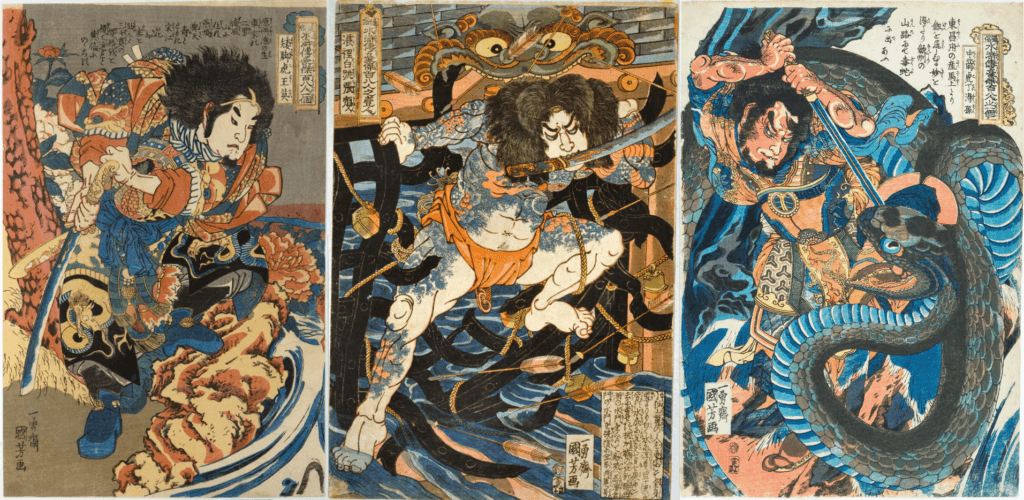
“Water Margin,” also known as “Outlaws of the Marsh,” is another classical novel, attributed to Shi Nai’an, that has had a profound influence on martial arts and popular culture. It tells the story of 108 outlaws who gather at Mount Liang to form a sizable army, rebelling against corrupt officials and fighting for justice, before being granted amnesty by the government. The novel is notable for its rich characterizations and vivid depictions of martial arts and combat.
Influence on Martial Arts:
- Brotherhood and Loyalty: The themes of brotherhood and loyalty among the outlaws are central to many martial arts schools, promoting camaraderie and mutual support.
- Combat Techniques: The novel’s vivid descriptions of hand-to-hand combat and weaponry have inspired various martial arts techniques and training methods.
Societal Influence
Cultural Values and Ethics
Classical literature reinforces cultural values and ethical principles, such as:
- Filial Piety: The importance of family and respecting one’s elders.
- Righteousness: Upholding moral integrity and justice.
- Bravery and Loyalty: Emphasizing the virtues of courage and loyalty to one’s comrades and country.
Global Influence
The impact of these works extends beyond China’s borders, influencing literature, cinema, and martial arts practices worldwide:
- Cinematic Adaptations: Films like “Crouching Tiger, Hidden Dragon,” “Hero,” and “The Matrix” draw heavily from classical literature, bringing Chinese cultural themes to global audiences.
- Literary Inspiration: Western authors and filmmakers have incorporated elements from these tales into their own works, blending Eastern and Western storytelling traditions.
Conclusion
Chinese classical literature, especially works like “Journey to the West” and “Romance of the Three Kingdoms,” has had a lasting influence on martial arts, societal values, and global literature. These stories, rich in cultural heritage and moral teachings, continue to inspire and educate, promoting the preservation and appreciation of Chinese culture. As these works find new audiences worldwide, they foster cross-cultural understanding and highlight the universal themes of heroism, integrity, and the quest for knowledge and self-improvement.
